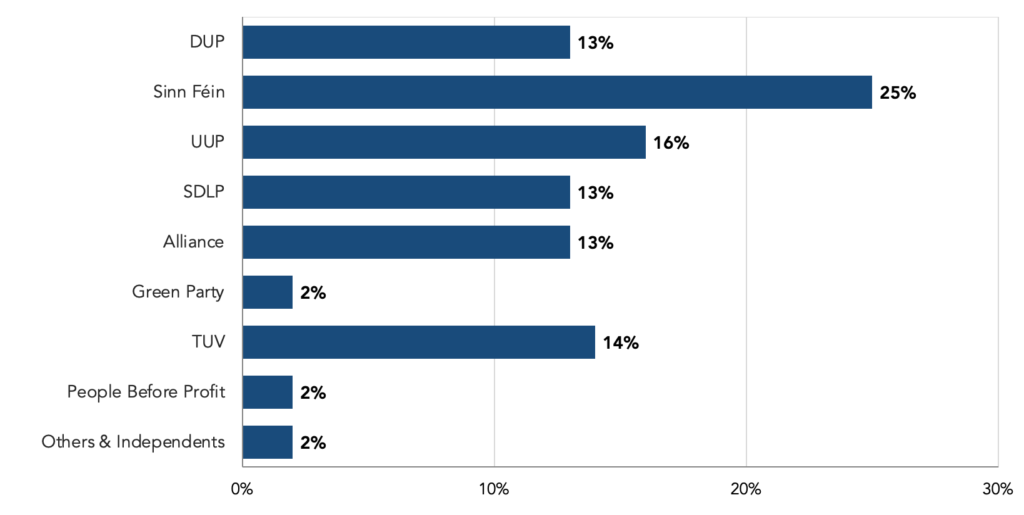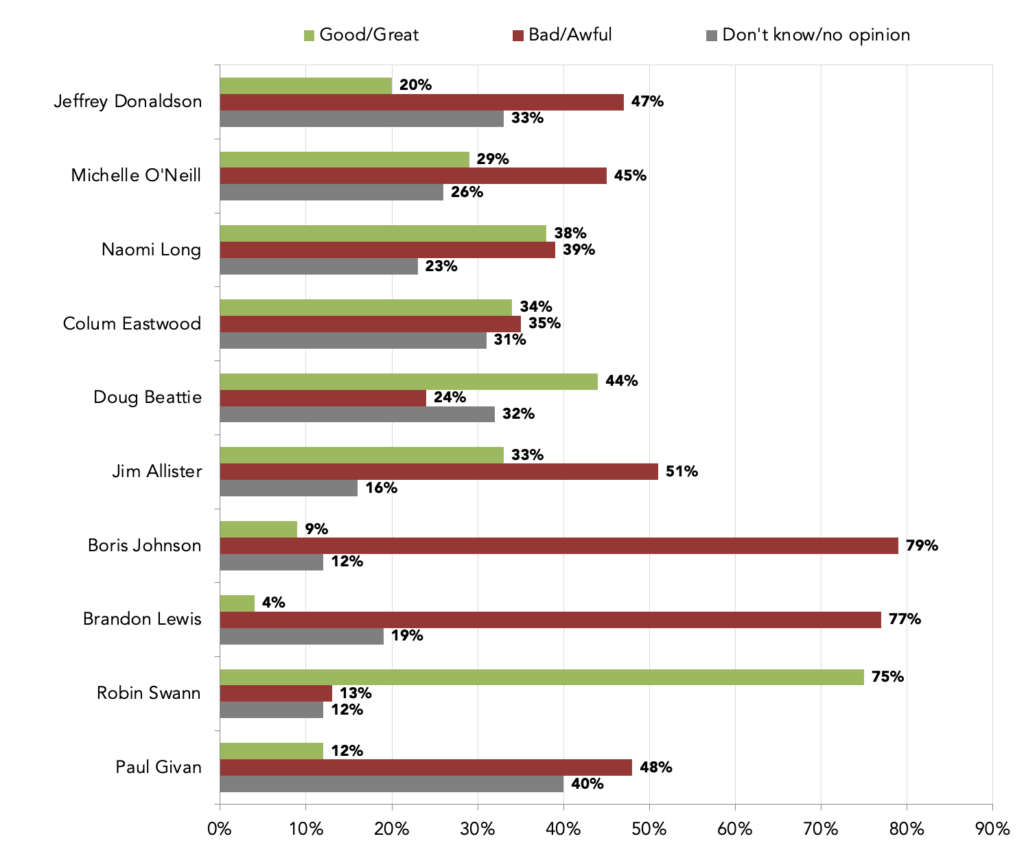LucidTalk and the Belfast Telegraph’s regular quarterly poll returned this Saturday, and it was a big one. Support for the DUP and Alliance has slumped, the UUP is on the up, Sinn Féin and the SDLP hold steady, and Jim Allister might not be the TUV’s sole MLA after May’s Assembly election.

DUP
The poll was our first chance to see how the public feels about the DUP’s new leader, Jeffrey Donaldson, and First Minister, Paul Givan. Let’s just say it wasn’t what Donaldson would have hoped for. Just 13% said they would give their first preference to the DUP if an election were held tomorrow, down 3 points on May.
The short, tumultuous reign of Edwin Poots resulted in his own net approval rating of -52%, with just16% thinking he was doing a good job according to the previous poll. Donaldson always had room to improve from such a low base, but so far the DUP’s decline continues.
However, Donaldson’s personal rating of -27% is quite a lot better than that of his predecessor, but that will be of small comfort to a leader who has seen the party drop from being the dominant voice within unionism to being third in this poll (although, given the 2.3 margin of error, the DUP and TUV are effectively tied). He is the second least popular party leader, narrowly trailing the divisive figure of Jim Allister. His party’s First Minister, Paul Givan, is even more unpopular.

UUP
Doug Beattie, himself new to the post as leader of the UUP, has made an inroad amongst the 42% of voters who had no opinion of him last time around. The decline of this group has left Beattie with a net approval rating of +20%, a figure that is practically unheard of in Northern Irish politics. Not only is he the only party leader to have a positive favorability rating, the only politician in Northern Ireland who receives a higher approval rating is his UUP Health Minister, Robin Swann. Swann’s net rating is a frankly incredible +63%,reflecting a widespread view that he has handled the pandemic well.
Beattie’s increased approval goes hand in hand with a bump – or ‘bounce’ – for his party in the poll overall. The UUP is on 16%, up three points on May, with some new support likely coming from people who had been planning to vote Alliance.
TUV
The TUV have rocketed up the polls in recent times, aided by Allister’s frequent media appearances and scathing critiques of the DUP and the Northern Ireland Protocol. The TUV will be delighted that this poll puts it on 14%, and would suggest that a second seat in North Antrim is very likely. However, the party will need to prove that it isn’t a one man show in order to turn these polling figures into reality. If it is successful, the TUV could emerge as a genuine threat to Northern Ireland’s status quo.
Estimates of up to 15 seats have floated around the twittersphere, but the party would need to build a ground level campaign and become less Allister-centric to make that happen.
Alliance
Ask anyone in Alliance a few years ago if they’d take being level in the polls with the DUP and they’d have jumped at the chance, yet this particular poll is disappointing for the party. Falling three points to 13%, ‘Alliance surge’ does seem to be coming to an end as Doug Beattie’s efforts to portray a more liberal UUP appear to be bearing fruit. Naomi Long’s personal net approval rating has also fallen from +8% to -1% since May.
That said, Alliance won just 7% of first preference votes at the last election, so 13% would represent an almost doubling of their support. They would be in contention for a lot more seats in this scenario, particularly if unionist votes are more split next time around
Sinn Féin
Sinn Féin will remain confident of becoming the largest party at May’s election. It holds steady on 25% – the same level of support for the party in May’s quarterly LucidTalk poll – but the collapse of the DUP has left it way out ahead. It would likely dominate a future Executive, particularly as the TUV can be expected to enter opposition. A Sinn Féin First Minister is now the most likely outcome after the next election.
SDLP
The SDLP has plodded along on similar support levels for years now. The latest poll puts the party on 13%, up marginally from May. Colum Eastwood remains relatively well liked with a net approval rating of -1%. He is much more liked than Sinn Féin’s leadership, but he hasn’t managed to tempt back some of the voters who have moved to the party’s main nationalist rival over the years.
The UK government should look away…
Although perhaps that’s precisely the problem.
There’s not much that everyone agrees on in Northern Ireland, but disliking Boris Johnson and his Conservative government seems to be an exception. Johnson has a net approval rating of -70%, making him the second-least popular politician in this poll; his Northern Ireland Secretary, Brandon Lewis, takes the crown (-73).
We need more polls
I mentioned in my previous LucidTalk poll analysis that it would be beneficial if other companies could step in and conduct their own regular polling of party support. LucidTalk’s panel-based approach has an excellent track record, but it is always better to be able to parse through a selection of different methods. Furthermore, if LucidTalk’s methodology ever did stop being so accurate we would have no idea until election day, which could impact how many candidates the parties stand in certain constituencies and so impact the results.
As it stands, this poll will give the parties plenty of food for thought. It seems we’re heading for quite a seismic election if these trends hold in the coming months and, ultimately, translate into votes.
Technical details of the LucidTalk poll:
Polling was carried out online from 20 August until 23 August 2021. The survey targeted the established Northern Ireland Lucid Talk online Opinion Panel (13,688 members).
Some 2,435 full responses were received. Data were weighted by age, sex, socio-economic group, previous voting patterns, constituency, constitutional position, party support, and religious affiliation, with a weighted sample of 2,403 used in the analysis.
All aggregate results are accurate to a margin of error of +/-2.3%, at 95% confidence.
